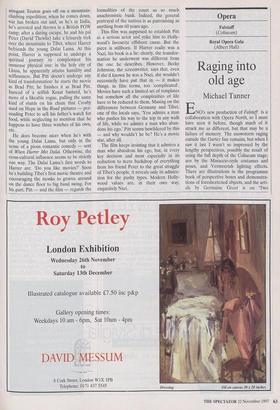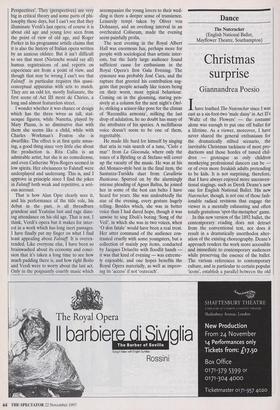Opera
Falstaff (Coliseum)
Raging into old age
Michael Tanner
ENO's new production of Falstaff is a collaboration with Opera North, so I must have seen it before, though much of it struck me as different, but that may be a failure of memory. The snowstorm raging outside the Garter Inn remains, but when I saw it last I wasn't so impressed by the lengthy perspectives, possibly the result of using the full depth of the Coliseum stage; nor by the Masaccio-style costumes and poses, and Vermeerish lighting effects. There are illustrations in the programme book of perspective boxes and demonstra- tions of foreshortened objects, and the arti- cle by Germaine Greer is on 'Two Perspectives'. They (perspectives) are very big in critical theory and some parts of phi- losophy these days, but I can't see that they illuminate Verdi's last opera; of course it is about old age and young love seen from the point of view of old age, and Roger Parker in his programme article claims that it is also the history of Italian opera written by an anxious oldster. But it isn't difficult to see that most (Nietzsche would say all) human registrations of and reports on experience are from a point of view, and though that may be wrong I can't see that Falstaff in particular requires this quasi- conceptual apparatus with sets to match. They are an odd lot, mostly Italianate, the first scene of Act III more de Chirico, a long and almost featureless street.
I wonder whether it was chance or design which has the three wives as tall, stat- uesque figures, while Nanetta, played by Mary Plazas, is so diminutive that with them she seems like a child, while with Charles Workman's Fenton she is dwarflike. The effect is at first quite amus- ing, a good thing since very little else about the production is. Rita Cullis is an admirable artist, but she is no comedienne, and even Catherine Wyn-Rogers seemed in low spirits. Her obeisances to Falstaff were underplayed and undersung. This is, and I approve in principle since I find the jokes in Falstaff both weak and repetitive, a seri- ous account.
That is how Alan Opie clearly sees it, and his performance of the title role, his debut in the part, is all threadbare grandeur and Yeatsian lust and rage danc- ing attendance on his old age. That is not, I think, Verdi's opera but it makes for inter- est in a work which has long inert passages. I have finally put my finger on what I find least appealing about Falstaff. It is overex- tended. Like everyone else, I have been so brainwashed about its economy and conci- sion that it's taken a long time to see how much padding there is, and how right Boito and Verdi were to worry about the last act. Only in the poignantly courtly music which accompanies the young lovers to their wed- ding is there a deeper sense of transience. Leisurely tempi taken by Oliver von Dohnanyi, and an overlong interval in an overheated Coliseum, made the evening seem painfully prolix.
The next evening in the Royal Albert Hall was enormous fun, perhaps more for people with sociological than artistic inter- ests, but the fairly large audience found sufficient cause for enthusiasm in the Royal Opera's first Gala Evening. The cynosure was probably Jose Cura, and the rapture that greeted his contribution sug- gests that people actually like tenors being on their worst, most typical behaviour. Coming on in the gloaming, staring pen- sively at a column for the next night's Otel- lo, striking a scissor-like pose for the climax of 'Recondita armonia', milking the last drop of adulation, he no doubt has many of the attributes of his species. A mellifluous voice doesn't seem to be one of them, regrettably.
He made life hard for himself by singing that aria in vain search of a tune, 'Cielo e mar" from La Gioconda, where only the tones of a Bjorling or di Stefano will cover up the vacuity of the music. He was at his del Monaco-style best in the final item, the Santuzza-Turiddu duet from Cavalleria Rusticana, Spurred on by the alarmingly intense pleading of Agnes Baltsa, he joined her in some of the best can belto I have heard for years. She was undoubtedly the star of the evening, every gesture hugely telling. Besides which, she was in better voice than I had dared hope, though it was unwise to sing Eboli's boring 'Song of the Veil', in which she was in two voices, when `0 don fatale' would have been a real treat. Her utter command of the audience con- trasted cruelly with some youngsters, but a collection of mainly pop items, conducted by Jacques Delacbte with floodlit hands it was that kind of evening — was extreme- ly enjoyable, and one hopes benefits the Royal Opera materially, as well as improv- ing its 'access' if not 'outreach'.



















































































 Previous page
Previous page